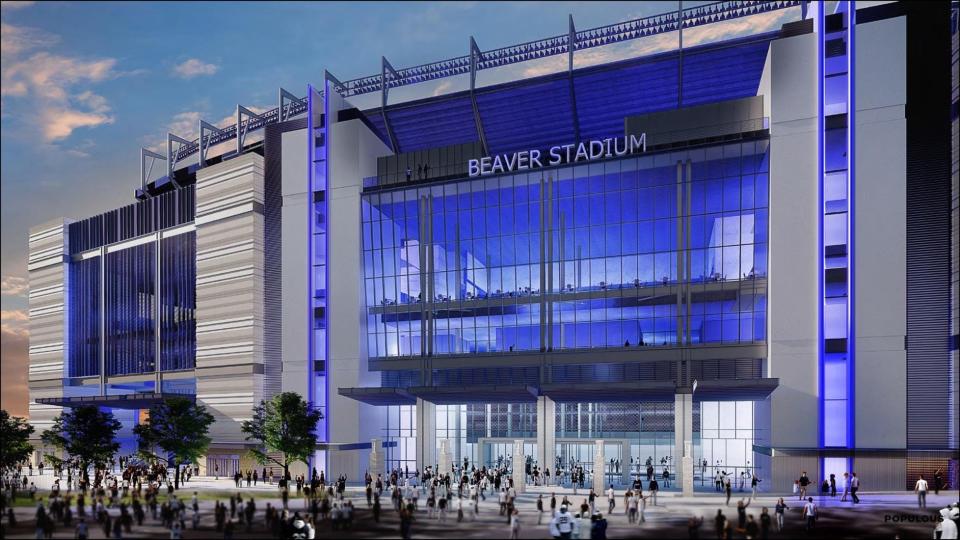What will $700 million buy? Penn State football's Beaver Stadium to be renovated by 2027
Penn State football will be getting all of its $700 million home renovation over the next three years.
The university's board of trustees, as expected, voted overwhelmingly Tuesday to approve the bulk of a Beaver Stadium facelift − a massive expenditure that will re-make the West side of the 64-year-old building. The vote passed by a 26-2 margin with three abstaining, including former Penn State assistant coach Jay Paterno.
Work to add amenities such as premium seating and suites, new elevators restrooms and concessions, is scheduled to begin upon completion of the 2024 football season and should conclude by the summer of 2027.
Penn State officials announced in February of 2023 their intentions for a large-scale renovation to the nation's second-largest stadium. Penn State President Neeli Bendapudi and athletic director Pat Kraft have reiterated over the past year that renovating would be significantly more economical than a potential $2 billion re-build.

Penn State's BOT already approved the first $70 million for the project last May. That included design and consulting work, backlogged maintenance and ongoing winterization of Beaver Stadium in order to host a potential December College Football Playoff game.
Penn State officials emphasized on Tuesday that not only will the project create new revenue streams but it will turn Beaver Stadium into a year-round entertainment destination − building upon the success of April's Luke Combs concert that drew 80,000 fans.
The renovations will be funded through loans, fundraising, sponsorships and new premium seating options − not with tuition dollars, student fees or from Penn State's overall budget, Bendapudi said.
The Beaver Stadium improvement list
Penn State officials announced last fall that it had hired Populous − a leading architectural firm led by former Nittany Lion and NFL linebacker Scott Radecic − to design the project. The West side of the stadium will be all but demolished and rebuilt, adding suite and loge boxes, club seating and reconstructing the press box.
Renovations will touch the entire stadium, particularly with wider concourses to aid in better fan circulation. In all, Penn State officials expect to add 24 elevators, 12 escalators, four stair towers and a couple of video scoreboards. Improved concessions will include about 100 new "points of sale."
A newly-constructed "welcome center" will give the stadium a "front door look" and will feature a 21,000 square-foot event facility.
On-field stadium lighting and wi-fi service plans to be upgraded, as well.
Construction will pause during the ensuing two football seasons.
"We are behind, both in fixing the necessary structural needs within the stadium and what we provide our fans. It is time for Penn State to catch up with its peers," Kraft said during Tuesday project presentation to the board of trustees.
"Beaver Stadium" he said, "should be a model for the college and the NFL world, with innovation, experiences that are different and exciting technology. If we fail to act, we will face significant infrastructure issues in the years ahead. The costs of repair will only increase."
The project received overwhelming support Tuesday despite the continued vocal dissent from Penn State board member Barry Fenchak, an alumni-elected trustee. (He and Anthony Lubrano voted against the project).
Fenchak has expressed his disapproval of the plan, saying that he believes the renovations, at this scope, are unaffordable. In a piece published on his website, Fenchak contends that the project would dramatically increase Penn State Athletics' debt − to about $877 million − and that Penn State doesn't possess the adequate revenue streams, including donation power, to pay for it.
PSU's next NFL Draft stars: What Penn State players could be drafted in 2025? An early look at NFL draft prospects
Penn State, playoff-bound? 5 things Penn State football must do to elevate, reach playoffs in 2024
This will be Beaver Stadium's third renovation since 2000 and would not, according to Kraft, drastically cut seating capacity. The 2001 expansion added about 12,000 seats, raising capacity to 107,282. A 2011 renovation slightly lowered capacity to comply with the Americans with Disabilities Act.
Frank Bodani covers Penn State football for the York Daily Record and USA Today Network. Contact him at fbodani@ydr.com and follow him on X, formerly known as Twitter, @YDRPennState.
This article originally appeared on York Daily Record: Beaver Stadium, Penn State football approved for mass renovations

